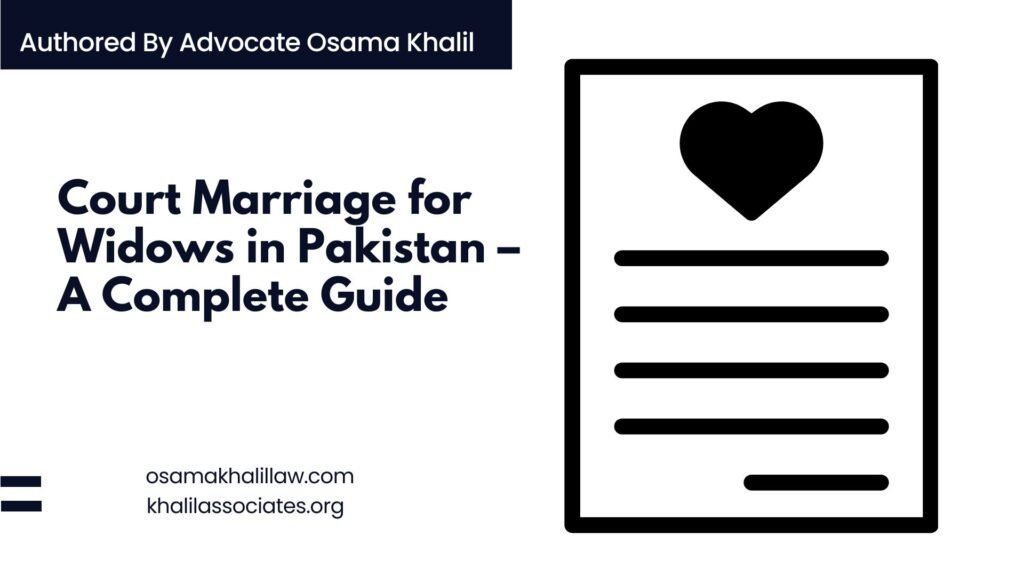
In Pakistan, many widows wish to remarry but often face social and legal challenges. However, court marriage provides a simple and legal way for widows to remarry without unnecessary complications. This article explains everything about court marriage for widows, including the process, requirements, and legal rights.
What is Court Marriage for Widows?
Court marriage for widows means a legal marriage conducted under the Family Laws of Pakistan. Unlike traditional weddings, court marriages do not require large ceremonies. Instead, the couple registers their marriage in court with legal documents. This process ensures that the marriage is valid under Pakistani law.
Legal Rights of Widows in Pakistan for Remarriage
Widows in Pakistan have the full right to remarry. Islamic law and Pakistani civil laws support widow remarriage. The law does not restrict widows from marrying again. However, society sometimes creates unnecessary barriers. Court marriage helps widows remarry without social pressure.
Why Choose Court Marriage for Widows?
Many widows prefer court marriage because it is simple, quick, and legally secure. Traditional weddings can be expensive and time-consuming. Court marriage avoids these problems. Additionally, court marriage protects the rights of widows, ensuring their new marriage is legally recognized.
Requirements for Court Marriage for Widows in Pakistan
Before proceeding with court marriage for widows, certain documents and conditions must be met. Here are the key requirements:
1. Proof of Identity
Both the widow and her future husband must provide their CNIC (Computerized National Identity Card).
2. Death Certificate of Previous Husband
Since the woman is a widow, she must submit the death certificate of her late husband.
3. Divorce Decree (If Applicable)
If the widow was divorced before becoming a widow, she should provide divorce papers.
4. Consent of Both Parties
Both the widow and her future husband must agree to the marriage without any force.
5. Witnesses
Two witnesses with valid CNICs must be present during the court marriage process.
6. Marriage Registration Form
The couple must fill out the marriage registration form provided by the Union Council or NADRA.
Step-by-Step Process of Court Marriage
Step 1: Visit the Union Council or NADRA Office
The couple must go to the nearest Union Council or NADRA office to start the process.
Step 2: Submit Required Documents
They must submit all necessary documents, including CNICs, death certificate, and witness details.
Step 3: Filling the Marriage Form
The couple fills out the marriage registration form with correct details.
Step 4: Verification Process
The authorities verify the documents and details provided.
Step 5: Marriage Certificate Issuance
Once verified, the marriage officer issues the Nikah Nama (Marriage Certificate).
Step 6: Registration with NADRA
Finally, the marriage is registered with NADRA for official records.
Challenges Faced by Widows in Court Marriage
Despite the legal provisions, widows may face difficulties in widow remarriage. Some common challenges include:
1. Social Stigma
Many people in society discourage widows from remarrying due to outdated customs.
2. Family Pressure
Some families oppose second marriage for widows due to cultural norms.
3. Legal Delays
Sometimes, the court marriage process gets delayed due to bureaucratic hurdles.
4. Financial Constraints
Widows with limited financial resources may struggle with legal fees.
How to Overcome These Challenges?
1. Legal Awareness
Widows should educate themselves about their rights under Pakistani law.
2. Support from NGOs
Many NGOs help widows with legal marriage for widows by providing legal aid.
3. Strong Willpower
Widows must remain determined and not let societal pressure stop them.
Benefits of Court Marriage
1. Legal Protection
Court marriage ensures the widow’s rights in case of any future disputes.
2. Quick Process
Unlike traditional weddings, court marriage is faster and hassle-free.
3. Low Cost
Court marriage is affordable compared to large wedding ceremonies.
4. No Social Pressure
Since court marriage is private, avoid unnecessary societal interference.
Islamic Perspective on Widow Remarriage
Islam fully supports Nikah for widows. The Quran and Hadith encourage widows to remarry if they wish. There is no Islamic restriction on widow remarriage. Therefore, widows should not hesitate to pursue court marriage if they want to start a new life.
Frequently Asked Questions (FAQs) About Court Marriage for Widows
1. Can a widow remarry without court marriage?
Yes, but court marriage provides legal security and avoids future disputes.
2. Is court marriage valid in Islam?
Yes, court marriage is fully valid as long as Islamic requirements (consent, witnesses, Mehr) are met.
3. How long does court marriage take for widows?
Usually, it takes 7 to 14 days if all documents are correct.
4. Can a widow remarry without her family’s consent?
Yes, as long as she is of legal age and agrees willingly, family consent is not legally required.
Conclusion
Court marriage for widows in Pakistan is a legal and straightforward way for widows to remarry. Despite social challenges, widows have full rights to widow remarriage under Islamic and Pakistani law. By following the correct process, widows can secure their future and live a happy married life again. If you are a widow considering remarriage, court marriage is the best option for legal protection and ease.
Legal Assistance
For professional legal guidance and support in immigration matters, you may contact:
Mr. Osama Khalil
Lawyer & Legal Consultant
📞 Phone: 0316-1829946
📧 Email: contact@osamakhalillaw.com | contact@khalilassociates.org
